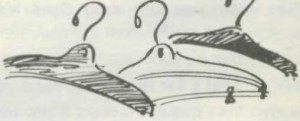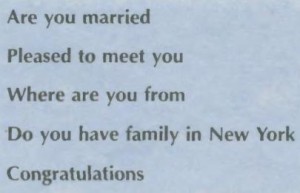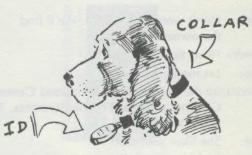Family Album 3 — Grandpa’s trunk
Смотреть онлайн курс — фильм на английском Family Album (хорошее качество, с английскими субтитрами):
In this episode, you will study. . .
VOCABULARY
trunk
stuff
hanger
aisle
mile
destination
anniversary
belongings
GRAMMAR AND EXPRESSIONS
simple present tense for future schedules
the preposition by
two-word verbs
sentences ending with too
PRONUNCIATION
intonation: either/or questions
stress: fifty/fifteen
U.S. LIFE
When do Americans retire?
Where do older Americans live?
YOUR TURN
• Is there a retirement age in your country?
• In your country, do grandparents usually live with their children and grandchildren?

You want coffee or tea? = Do you want coffee or tea? This is an either/or question, a question that asks for a choice between two things. In this kind of question, use a rising and a rising-and-falling intonation. The voice goes up on the first item (coffee); the voice goes up and then down on the second item (tea): Do you want coffee or
excited: nervous but happy about something.
will be sitting Use the progressive (-ing) verb tenses for an action that begins before and ends after a specific time. At this time tomorrow morning, Grandpa will be in the middle of sitting in the kitchen with the family.
When does he arrive? = When will he arrive? You can use the simple present tense to refer to future schedules. A schedule is a list of times for certain things to happen.
by plane: / by train: Use the preposition by with ways to travel: by car, by boat, by bus, by taxi.
picking (him) up: going to get (him) Pick up is a two-word verb. The word up is necessary for the meaning. If the direct object is a pronoun (him), it always comes between the two words. But if the direct object is not a pronoun, it may come before or after the two-word verb: Pick Grandpa up and pick up Grandpa are both correct. ‘
Huh. Here, this sound shows that Marilyn is thinking.

Morning. = Good morning.
fellas: fellows, Fellows means «men» or «boys.» It is an informal word.
Honey / darling / dear: Use this word to show that you feel close to someone. Honey is sometimes used by a woman to a man, by a man to a woman, or by a woman to another woman. It is never used by a man to another man.
set up: to prepare; make ready. Set up, like pick up, is a two-word verb. Marilyn says,» . . . set up Grandpa’s room.» She might also say, «set Grandpa’s room up.»
miss: to feel sad when remembering something you liked or loved and don’t have now
That’s for sure. = I agree with you about that. This is an informal expression.
neat: great; fine, This is an informal word.
I’ve got it! = I have an idea!
junior high school: Students attend junior high school after the sixth grade of elementary school, junior high school includes grades 7, 8, and 9.
graduation: completing studies at a school
railroad: train
by himself: alone. With by, you can also use myself, yourself, herself, itself, ourselves, yourselves, and themselves.
something: great; wonderful. This is an informal use.
bags: suitcases
we are, too. = We also are very excited. When too is at the end of a sentence, you sometimes do not repeat every word in the phrase or sentence before it. Here is another example: Ellen wants to prepare Grandpa’s room, and Marilyn does, too. In this sentence, does means «wants to prepare Grandpa’s room.»
till: until
disappointed: not satisfied; feeling that something is not as you hoped or wished
She always reminds him of Grandma. = Susan always makes him think of Grandma because Susan looks like her.
wondering: asking ourselves; thinking
Activities:
OPINIONS AND BELIEFS
What do you think? Read each sentence about Grandpa. Then circle a or 6 to show a logical opinion or belief.
1. Ellen: He doesn’t want anybody picking him up.
a. I guess he’s independent.
b. I guess he’s not a happy person.
2. Robbie: He’s so funny.
a. I bet he doesn’t like to laugh.
b. I bet people laugh when they are with him.
3. Richard: . . . I think he’ll like being here with the family.
a. I suppose he enjoys being with them.
b. I suppose he doesn’t want to live with them.
LOOK WHO’S TALKING
Who said each of the following sentences? Write the number of each sentence in the box below the picture of the correct speaker. If necessary, look back at the script for Act I to find the answers. The first answer is given.
1. «At this time tomorrow morning. Grandpa will be sitting in the kitchen with us.»
2. «I hope Grandpa’s going to like living with us.»
3. «You know, maybe I’ll put together some photos of Grandpa as a ‘welcome’ present.»
4. «I want to put some of my good hangers in Grandpa’s closet.»
5. «We were just wondering about this trunk.»
Philip / Marilyn / Richard / Robbie / Ellen
U.S. LIFE
Many Americans retire at the age of 65. Some retire at younger age, and others choose never to retire. The federal government provides social security (money each month) for workers who retire.
YOUR TURN
• Is 65 the retirement age in your country?
• How do older people in your country get money after they stop working?
Glossary:
Amtrak: a train company, with trains traveling between cities in the United States The name Amtrak comes from the words American, travel, and track.

Is this seat taken? = Is someone sitting here?
by: next to
aisle: the place to walk between rows of seats
This word has exactly the same pronunciation as I’ll.
I am, too. = I am from Florida, too.
get on: to enter. You also get on a bus and a plane. ,
Small world. = It’s a small world. You can use this expression if you are far from home and you meet someone who lives near you.
Miles: One kilometer = 0.6214 mile, or about 5/8 mile.
take time off: not go to work; stay away from work; Take off is a two-word verb.
shipped: sent
destination: the place where you plan to arrive at the end of a trip
fifty: In fifty, only the first syllable is strong. In fifteen, both syllables are strong.
to be exact: exactly
anniversary: a wedding anniversary; the date someone was married
Congratulations! = That’s great! Say congratulations to people when they tell you good news about themselves.
retired: stopped working, usually because of old age
Had my own company. = I had my own company. This means that Grandpa was the owner of the company.
construction company: a business for building things
roads: streets; highways
Would you kindly . . . ? = Please . . . Use this phrase to begin a formal request.
lady: woman. Unlike ma’am, this is not a very polite form.
Take your time. = It is not necessary to hurry.
purse: handbag; pocketbook
Yes, indeed. = That’s true.
must be: obviously are
I can’t wait! = I am excited.
permanently: with no plan to change
kids: children. This is an informal word.
mind: to care about.
Activities:
PERSONAL INFORMATION
There are some parts of the conversation between Grandpa and Elsa Tobin. On the blank lines, write the missing parts their conversation. Choose the correct answers from the box.
Elsa: I’m Elsa Tobin. How do you do?
Elsa: _____________________?
Grandpa: My wife died four years ago.
Elsa: ______________ in Florida?
Grandpa: Titusville. It’s near Orlando.
Elsa: John and I celebrate our fortieth anniversary next month.
Grandpa: _________________________!
Grandpa: ________________________?
No, no. But I do have very close friends in New York City.
NEXT STOP
the correct order of events in Grandpa’s life. Write letter of each sentence in the correct sign on the railroad. The first answer is given.
a. He left Florida.
b. He sold his business and retired.
c. He had a construction company.
d. He sent a trunk to his family in New York
e. His wife died.
U.S. LIFE
Some older Americans live in the same house as their children and grandchildren. Others live in senior citizen homes, or retirement communites. These are places where many older people live together.
YOUR TURN
• In your country, do grandparents usually live with their children and grandchildren?
• Are there retirement homes in your country?
belongings: personal things
the Big Apple: New York City
Look (us) up. = Call or visit (us). Look up is a two-word verb.
We’re in the phone book. = You can find our address and telephone number in the telephone book.
You name the day. = Tell me which day.
a day off: a day away from the job
all over the house: everywhere in the house
brings back memories: makes me think about past times.
delayed: made late
Pleasant dreams. = Sleep well. Use this phrase when someone is going to go to sleep.
researched: studied carefully to get facts and information
family tree: a chart of a person’s family history
How exciting! = That’s very exciting.
Why: Why is not a question word here. Why at the beginning of a sentence sometimes shows surprise. This is a formal use.
Activities:
THE FAMILY TREE
Here is the Stewarts’ family tree. What are the relationships among the people in the family? Refer to the family tree to complete the sentences. Choose your answers from the box. Write your answers on the blank lines.
husband / son / daughter / brother / sister / wife / grandson / sister-in-law
1. Philip is
Malcolm’s ________.
2. Susan is
Marilyn’s ________.
3. Richard is
Malcolm’s _______.
4. Robbie is
Richard’s _______.
5. Susan is
Ellen’s ________.
6. Ellen is
Philip’s ________.
7. Richard is
Marilyn’s _______.
8. Susan is
Robbie’s _______.
WHAT DO YOU SAY?
What might you say in each of the following conversations? Choose your answers from the box. Then write each answer on the correct line. Use each answer only once.
That’s for sure / I’ve got it / Small world / Congratulations / Take your time / I can’t wait / Look me up / Pleasant dreams
1. «I’ll be in your city next month.» ________. Maybe we can have dinner together.»
2. «I’m from Washington.» _________. I am, too.»
3. «I found a wonderful new job last week.» “__________!”
4. «This is a very interesting television program.” “________. There’s nothing else like Family Album, U.S.A.»
5. «I’m still eating.» “_______. We don’t have to leave for another hour.»
6. «Good night.» «__________. I’ll see you in the morning
7. «I heard that you will be taking a vacation next month.» «Yes, _______. I need some time off.»
8. «It’s Dad’s birthday next week. What can we give him?» _______! Let’s make a family tree for him”.







Хотелось бы получить пояснения по предложению: At this time tomorrow morning, Grandpa will be in the middle of sitting in the kitchen with the family. Действительно ли так говорят в США и Англии?